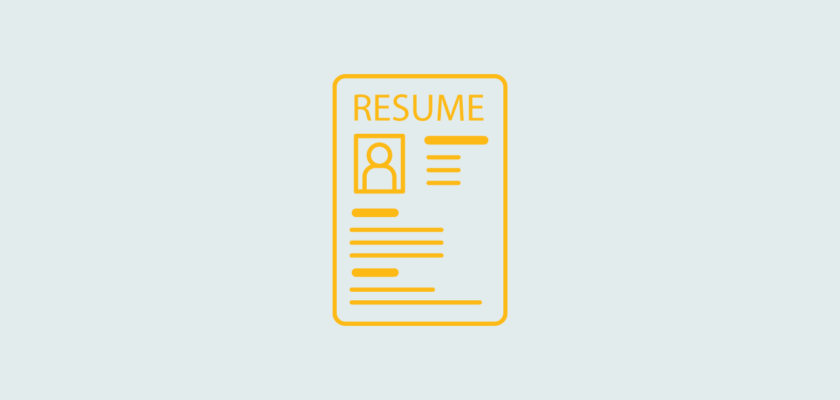If you are applying for a job, your resume is your opportunity to stand out against the other candidates, and in a competitive market, it is the best tool you have to land the perfect job. Yet many people rush through the resume writing process without giving it much thought.
Give yourself the edge the next time you apply for a job by spending time writing a quality resume that will showcase you to any potential employers. Here are some of the benefits of a well-written resume.

Table of Contents
- Chance to make a great first impression
- Helps You Stand Out
- Highlights Your Achievements and Success Stories
- Gives You a Head Start in an Interview
- How to Make Your Resume Stand Out
- What to Include in Your Resume
- Final Thoughts
Chance to make a great first impression
You only get one chance to make a first impression and your resume is the perfect opportunity to look your best. Once you get to the interview stage, you will have to think on your feet and improvise, but your resume gives you a chance to put across a well-thought-out image of yourself and impress your potential employers.
Make it happen
On average, employers only spend six to seven seconds scanning a resume, so you can’t afford to put anything in there that doesn’t make you stand out. Be sure to tailor your strengths and qualities to match the job you are applying for. Most employers will have keywords in their minds they are hoping to see – work out what they are and put them near the top!

Helps You Stand Out
Depending on the position you are applying for, you may be up against dozens, or even hundreds of other potential candidates. Assuming the employer has never met you, your resume needs to catch their eye immediately, to give you a chance of being selected for an interview.

Make it happen
While you can easily find standard resume templates online, your application will stand out more if it doesn’t look identical to the others. This doesn’t mean you should change the background to pink – no seriously, don’t! – but changing the standard format and adding sections unique to you will catch the employer’s eye and hopefully get you to the top of the pile. By all means, look at some templates for inspiration, but be sure to add your own touches to make it look unique.
Highlights Your Achievements and Success Stories
Your resume is the chance to really show what you can do – this is not the time to be shy or modest!

Employers will be looking for someone that can fit seamlessly into their company and your strengths and achievements will give them a good idea of whether you will be a good fit or not.
Make It Happen
If you are applying for many jobs, make sure you are refreshing your achievements and strengths for each position. Research the job thoroughly and include qualities and experiences that are relevant to the position you are applying for. Employers can spot a generic CV a mile away and it will likely end up on the rejection pile if it isn’t tailored to the job. Be sure to include evidence of each of your achievements with relevant examples from past or current jobs – don’t just write a list.
Gives You a Head Start in an Interview
Writing your resume is not only a chance to sell yourself to your potential employer, it is also an opportunity to start preparing for the interview which you will be hoping to be invited to. You may not be given much notice to prepare for your interview, so give yourself an advantage by getting ready before you even send off the application!

Make it happen
Spend plenty of time researching the company you are applying to before sending off your resume and application. Even if you are very familiar with the industry, make sure you familiarize yourself with this company in particular and make it clear in your resume that you have done so. Each application should be individual in order to stand out, so make sure you know the company inside out. This will give you a big advantage during an interview, as you will be able to prepare your answers based on the research you have already done.
How to Make Your Resume Stand Out
Keep it to One Page
For most people, a single-page resume is preferred. Your resume is a chance to show that you have good communication skills, including conveying information in a concise manner. If you need six pages to explain why you are the right person for this job, then your communication skills need some work! A one-page resume makes all of your information scannable for the recruiter, who only has a few seconds to make their initial decision about your application. You don’t want to put them off straight away with a bulky resume.
The exception to this would be if you have a long, relevant job history with loads of experience that you need to describe in detail. In this case, two pages will be acceptable, but be sure to include the most relevant information on the first page, and keep the pages organized to make it easy for the recruiter to find what they need.
Use Examples to Back Up Your Claims
While it is important to sell yourself, simply listing your strengths and skills may not convince your potential employer. Give evidence of how you have shown this in your past or current employment while keeping it short and succinct. Remember to be specific and avoid rambling or using filler words.
Don’t Use Clichéd or Dated Language
Put yourself in the shoes of your potential employer – what words and phrases do you think they hear all the time? Phrases such as ‘team player’ and ‘detail-oriented’ are overused on job applications and don’t actually mean anything. Try to be unique in the words you use and use phrases that will set you apart from others.
For example, rather than describing yourself as results-driven, use a specific example of the results you have achieved in your current job. Also, don’t be tempted to use overly fancy words to impress, keep it simple and direct.
If you really must write that you have good attention to detail, make sure there are no mistakes in your resume to prove you wrong!
Keep it Organized and Well-Formatted
The key to catching the recruiter’s eye is to make your resume as scannable as possible. This means making your titles big and bold and the rest of the content consistent in size and alignment. If you are required to hand in a paper version, keep it immaculate in a plastic folder, to make sure it doesn’t get folded or creased.
What to Include in Your Resume
As discussed above, it is important not to follow a template to the letter when writing your resume, as this will not help it stand out. However, there are essential sections that you should keep in mind when planning an outline for your CV.
Personal Information
This section should be the easiest part of your resume to write, but if you make a mistake and provide incorrect contact information, they will be unable to contact you if you are successful! So make sure it is accurate!
It is up to you how much you want to include, but essentials would be name, phone number, and email address. You may also wish to include links to your business accounts, such as Linkedin or your professional website. Unless they have requested it, there is no need to include your address, as it will take up valuable space on the page.
Make sure your name stands out at the top by using a larger font than the rest of the information.
Summary/Personal Statement
Use this section as a brief opportunity to sell how fabulous you are! You want to add as much value as you can in this section, so this is your chance to mention anything important that doesn’t appear in the rest of your resume. Mention your current job and any professional achievements that are relevant. Try to use keywords from the job advert when describing your skills and qualities.
Job History
Next up is job history, normally listed in reverse chronological order, meaning you start with your current or most recent job and work backward. The reason for this is that your current job is likely to be more relevant to your position than jobs from 20 years ago.
If you have had many jobs, you only need to include the most relevant ones. The six months you worked part-time in Mcdonald’s are of no interest to the accounting firm who are considering hiring you, so don’t waste valuable space on your resume mentioning it.
If you are applying for your first job or changing careers, include any work experience or voluntary work that is relevant, or that showcases skills which are important to this new position.
Education
As with your jobs, you don’t need to include every single aspect of your education. If you’ve been in the workplace for 20 years, it is unlikely any employer is interested in your high school grades. Stick with the highest education you have achieved, but add any additional qualifications if they are relevant to the position. This includes certifications you may have achieved in the workplace.
Skills and Qualities
This section is your chance to really showcase your talents, and should be edited for every job you apply for, to keep it relevant to the position. Once again, choose the skills that are most relevant to this career. Try to use similar language that the company has used on their application or their website. This will show them that you are genuinely interested in this job and not just sending in a generic application.

Many companies now use bots to scan applications looking for certain keywords, so think about what they may be and try to include them.
Hobbies and Interests
This section of the resume is optional – if you have hobbies that are relevant to the job, or use similar transferable skills, then put them in. Otherwise, leave them out and use the space for something else.
Final Thoughts
Whether you are starting out your career or embarking on a change of career direction, the opportunity of landing your dream job is worth putting a little effort into. Take the time to craft a resume that shows employers how perfect you will be for their company and make yourself stand out against the other candidates.
